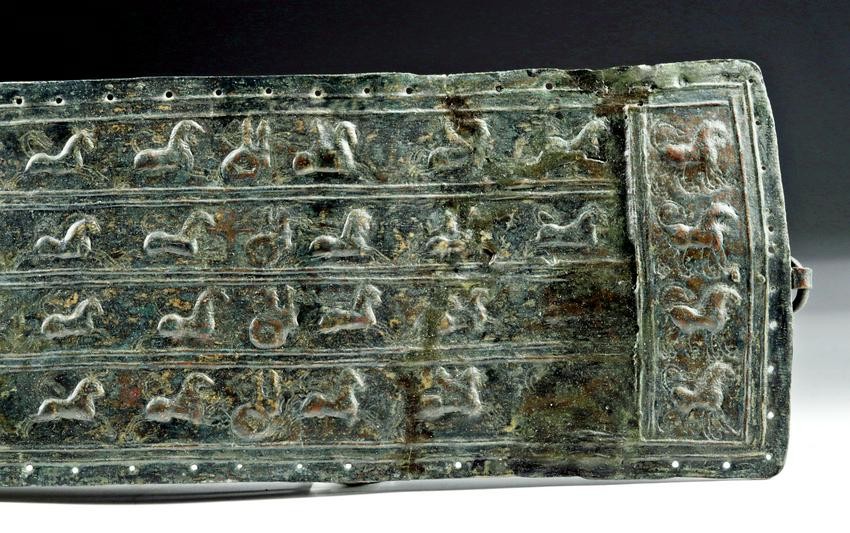Anatolian Urartu Bronze Belt - Chariots (complete)
Caucasus region, modern day eastern Turkey (Anatolia) / Armenia, Urartu culture, ca. 9th to 7th century BCE. It is incredibly rare to find a complete Urartian belt. This example, made from hammered bronze and decorated in low relief/repousse with a central band of four horizontal bands of repeated figures - charioteers pulled by horses, occasionally interrupted by large floral motifs. Each band has a raised border. Around the edges on two sides are a series of tiny perforations. Who are these charioteers? Are they in a royal or religious procession, or are they on their way to war? They might even signify gods - the storm god of Que has a monumental statue depicting him driving his chariot, today on display in Karatepe-Arslantas National Park. The repetition highlights the power of the person who wore this belt, suggesting that they commanded many. A small ring at one end shows how the belt was clasped around the waist - a slender one, in this case. Size: 32.5" W x 4.95" H (82.6 cm x 12.6 cm)
Bronze belts bearing repeated motifs of gods, hunting scenes, animals, and geometric and floral patterns are one of the most enduring remains of the Urartian Kingdom, which stretched from the Euphrates in the west to Iran in the East. Their military success has been attributed to their chariots, and their artwork, like this belt, attests to this. This is fascinating as chariots had only recently been invented, and how they built them and how many they actually built remain mysteries.
An Urartian bronze belt of a similar size sold for 8,750 GBP ($11,733) at Christie's London, Sale 1561, Antiquities, October 1, 2014 - Lot 146. (https://www.christies.com/lotfinder/Lot/an-urartian-bronze-belt-circa-8th-7th-century-5826732-details.aspx)
Provenance: private East Coast, USA collection; ex-Frances Artuner collection, Belgium, acquired in the 1960s
All items legal to buy/sell under U.S. Statute covering cultural patrimony Code 2600, CHAPTER 14, and are guaranteed to be as described or your money back.
A Certificate of Authenticity will accompany all winning bids.
We ship worldwide to most countries and handle all shipping in-house for your convenience.
#143833 Dimensions: Condition Report: Restored from four pieces with small areas of overpaint covering the restoration. Small tears along peripheries. Motifs are still nicely visible, with the surface covered with a pretty dark green patina.
View it on
Sale price
Estimate
Time, Location
Auction House
Caucasus region, modern day eastern Turkey (Anatolia) / Armenia, Urartu culture, ca. 9th to 7th century BCE. It is incredibly rare to find a complete Urartian belt. This example, made from hammered bronze and decorated in low relief/repousse with a central band of four horizontal bands of repeated figures - charioteers pulled by horses, occasionally interrupted by large floral motifs. Each band has a raised border. Around the edges on two sides are a series of tiny perforations. Who are these charioteers? Are they in a royal or religious procession, or are they on their way to war? They might even signify gods - the storm god of Que has a monumental statue depicting him driving his chariot, today on display in Karatepe-Arslantas National Park. The repetition highlights the power of the person who wore this belt, suggesting that they commanded many. A small ring at one end shows how the belt was clasped around the waist - a slender one, in this case. Size: 32.5" W x 4.95" H (82.6 cm x 12.6 cm)
Bronze belts bearing repeated motifs of gods, hunting scenes, animals, and geometric and floral patterns are one of the most enduring remains of the Urartian Kingdom, which stretched from the Euphrates in the west to Iran in the East. Their military success has been attributed to their chariots, and their artwork, like this belt, attests to this. This is fascinating as chariots had only recently been invented, and how they built them and how many they actually built remain mysteries.
An Urartian bronze belt of a similar size sold for 8,750 GBP ($11,733) at Christie's London, Sale 1561, Antiquities, October 1, 2014 - Lot 146. (https://www.christies.com/lotfinder/Lot/an-urartian-bronze-belt-circa-8th-7th-century-5826732-details.aspx)
Provenance: private East Coast, USA collection; ex-Frances Artuner collection, Belgium, acquired in the 1960s
All items legal to buy/sell under U.S. Statute covering cultural patrimony Code 2600, CHAPTER 14, and are guaranteed to be as described or your money back.
A Certificate of Authenticity will accompany all winning bids.
We ship worldwide to most countries and handle all shipping in-house for your convenience.
#143833 Dimensions: Condition Report: Restored from four pieces with small areas of overpaint covering the restoration. Small tears along peripheries. Motifs are still nicely visible, with the surface covered with a pretty dark green patina.



